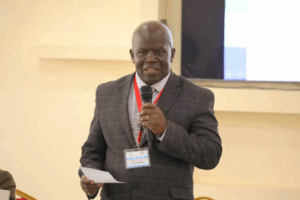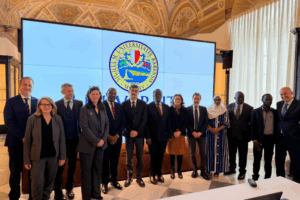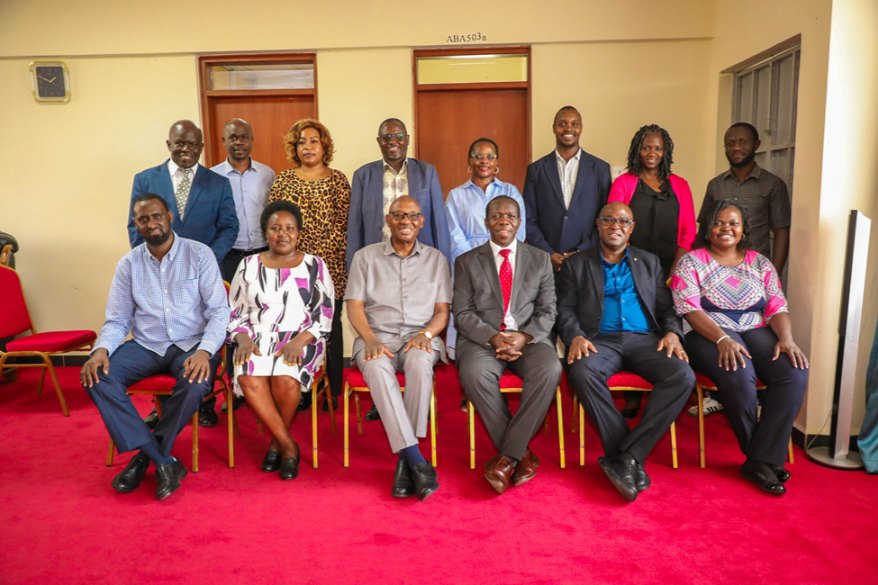
MMUST Set To Partner With Nupea To Develop Academic Programme In A Bid To Produce Local Professionals In Nuclear Energy
Masinde Muliro University of Science and Technology (MMUST) is set to partner with the Nuclear Power and Energy Agency (NuPEA) to develop a Diploma programme in nuclear energy, aiming to produce the local professionals required for Kenya’s first nuclear power plant. This collaboration is a direct response to the Government of Kenya’s plan to set up the plant in Siaya County, with construction scheduled to commence in 2027. On 1st October, 2025, a delegation from NuPEA, led by its Chairman, Eng. Prof. Lawrence Gumbe, paid a courtesy call on the Vice Chancellor-Prof. Solomon Shibairo, to discuss the country’s strategy for the nuclear power programme, including the role the new Diploma programme will play in realizing this national agenda.
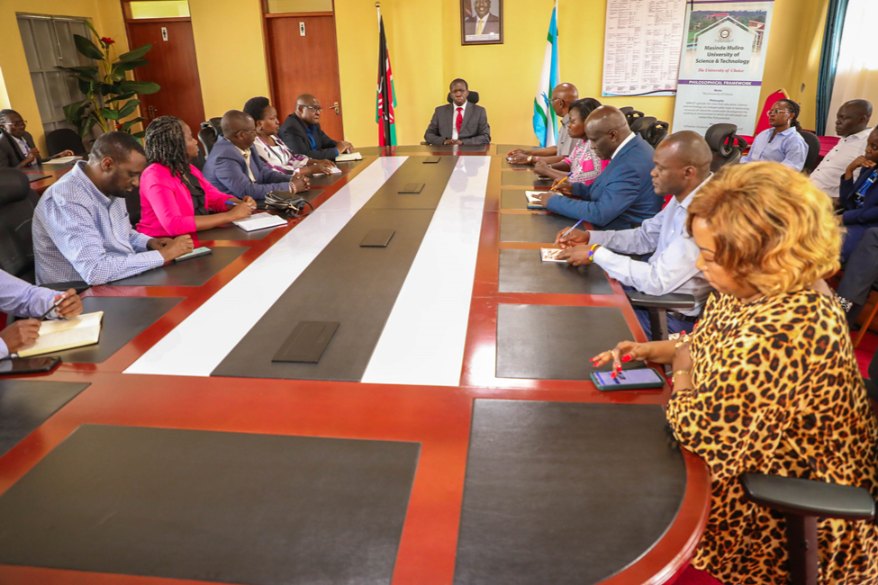
The Vice Chancellor-Prof. Solomon Shibairo chairs the meeting with NuPEA at the Boardroom.
Speaking during the meeting, Prof. Shibairo endorsed the initiative, highlighting the economic necessity for inclusion of nuclear power as a source of energy in the country.
“The basic idea for the nuclear sector is not solely about energy. The technology’s application is broad, extending well beyond electricity. Currently, we are actively using nuclear materials and isotopes in many areas including, medicine and healthcare, where prevention, diagnosis through imaging and treatment of some health problems are realized through the application of nuclear techniques, such as nuclear medicine. These techniques have also been applied in agriculture to ensure food security as they are used to improve crop yields, fight pests and preserve food. Additionally, they have been adopted in the industry and engineering sector as well as water management,” said Prof. Shibairo, emphasizing the crucial need for MMUST’s collaboration with NuPEA, to produce the skilled personnel and research, which will inform future developments in the nuclear energy industry.
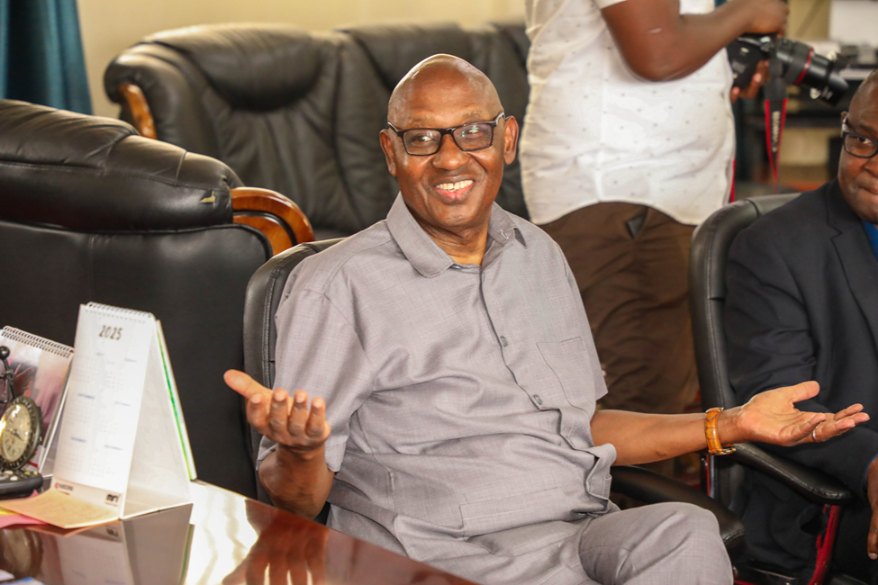
NuPEA’s Chairman, Eng. Prof. Lawrence Gumbe speaks during the courtesy call meeting.
Citing the University’s strong foundation in Science and Engineering, Eng. Prof. Lawrence Gumbe affirmed NuPEA’s confidence in MMUST’s capacity to produce the required expertise for the nuclear sector.
“NuPEA holds the legal mandate for implementing Kenya’s nuclear power programme and conducting research, development, and dissemination activities in the energy and petroleum sectors. We are excited to work with MMUST because of its strength in Science and Engineering as well as its foundation in research. This collaboration will significantly advance our nuclear initiatives,” he stated.
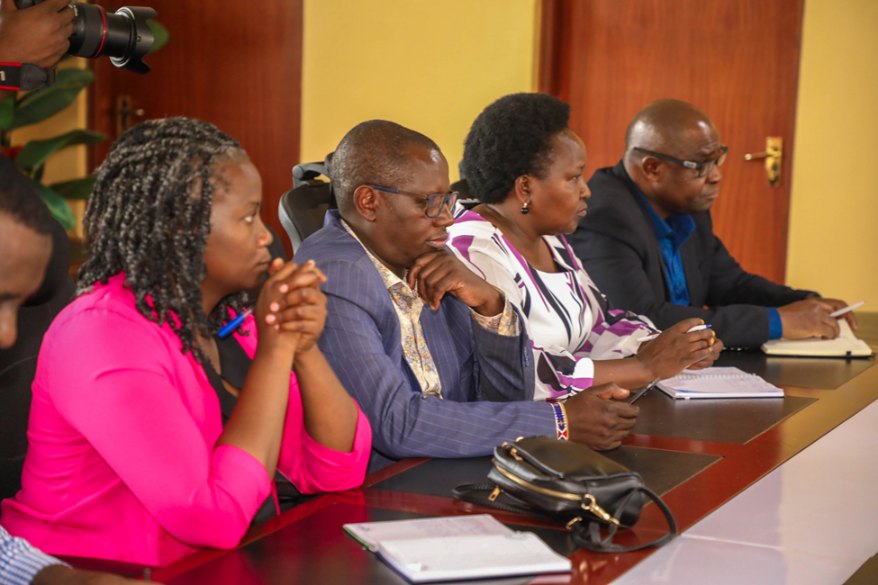
A section of participants keenly follows discussions.
Addressing the question of safety, accidents, and potential harmful effects on the environment, Eng. Prof. Gumbe assured the participants that nuclear energy has the lowest death rate per kWh of any major energy source. He acknowledged the Chernobyl, Fukushima as well as the constant threat of nuclear war, and stressed that stringent measures have been put in place to ensure safety standards in the nuclear sector.
“Nuclear energy is statistically one of the safest sources of power available. The number of fatalities per terawatt-hour of energy produced shows that gas has about 26 deaths and hydro-electricity has approximately 1.3 deaths. In contrast, nuclear, solar and wind energy sources each register about 0.03 fatalities making it very safe. Safety is further ensured through stringent international protocols, for instance, the entire project will be undertaken under the guidance of the International Atomic Energy Agency (IAEA), whose safeguards are notably stringent, even surpassing those in the aviation industry. Additionally, the World Association of Nuclear Operators (WANO), continuously enhances safety standards globally. The evolution of nuclear plant design, from the first ones in the 1950s to the modern ones has been progressive, and today, we have extremely safe models, many of which are now constructed underground. There is increased safety all the time,” he explained.
Reiterating NuPEA’s commitment, the Chief Executive Officer- CS Justus Wabuyabo confirmed the agency’s strategy to partner with institutions of higher learning across the region. “We want to start having programmes with universities and academic institutions in this region so that they can begin training the personnel who will work in the nuclear plant. We will need a wide range of workers including plumbers, masons, engineers and social scientists, and we hope that MMUST will be one of the anchor institutions that will offer these training,” he stated.
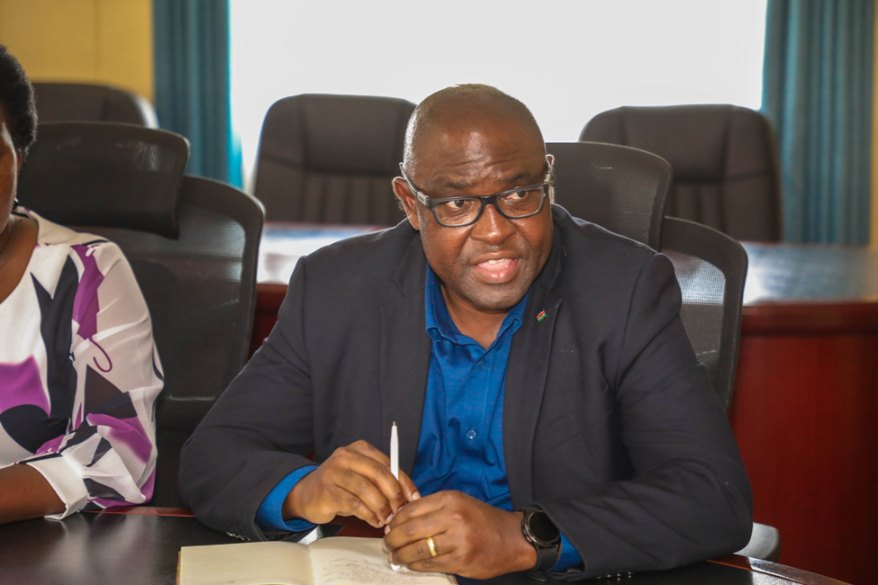
NuPEA’s Chief Executive Officer- CS Justus Wabuyabo makes a point during the meeting.
Notable members present from MMUST included the Ag. Deputy Vice Chancellor Planning Research and Innovation, Prof. Peter Bukhala; Director International Relations and Academic Linkages (DIAL)- Dr. Umulkher Ali; Dean School of Engineering and Built Environment (SEBE), Eng. Prof. Bernadette Sabuni; Associate Dean SEBE, Dr. Peter Cherop; CoD Mechanical and Industrial Engineering, Dr. Emmanuel Osore; and CoD Electrical and Communications Engineering, Dr. James Owuor. Also present were NuPEA Board members, Dr. Ann Michura, Ms. Carren Akinyi, Mr. Abdisalan Adow Abdi, Mr. Joseph Mwaura, Ms. Irene Okwach, and Ms. Lilian Wanjama.
According to United Nations’ Africa Renewal, the International Energy Agency estimates that growth in Africa’s industry, commerce and agriculture will require electricity demand to grow by 40% by 2030. ECA also assesses that the African Continental Free Trade Area electricity needs will account for 8% of the total continental electricity capacity by 2035, and 14% by 2040, requiring additional investment of $22.4 billion between 2025 and 2040. Furthermore, by 2040, due to rapid population and economic growth in Africa, the electricity supply must expand by more than 4 times.
There is no doubt that governments need to tap into the reliability of nuclear power for sustainable development. MMUST’s commitment to partnering with NuPEA to support Kenya in achieving its goal of developing an affordable, clean, and efficient energy from nuclear power, through specialized academic programmes and research initiatives will definitely go a long way in ensuring sustainability of this key sector.
By Caren Nekesa
Photos by Shiundu Masafu

